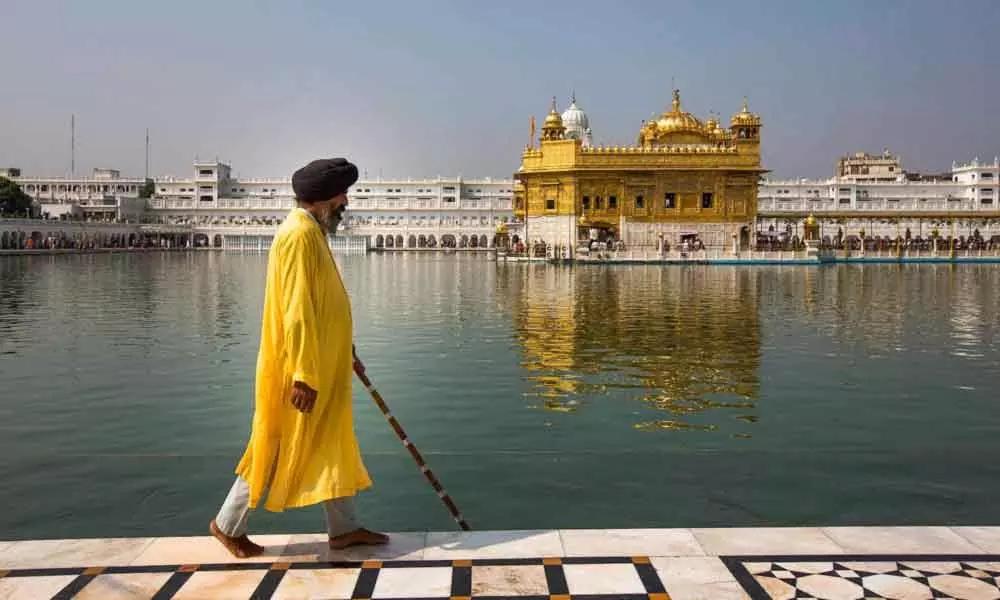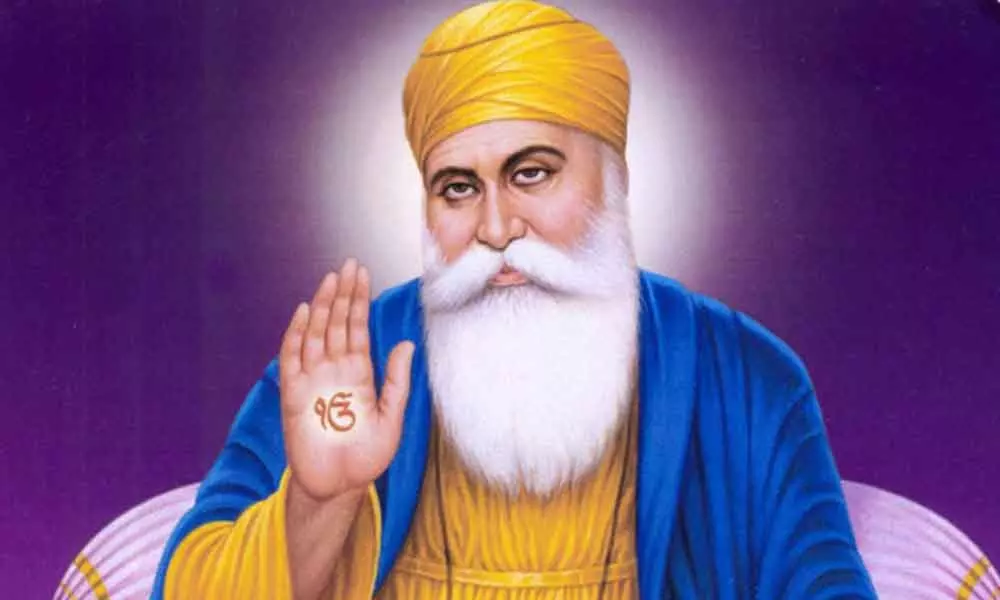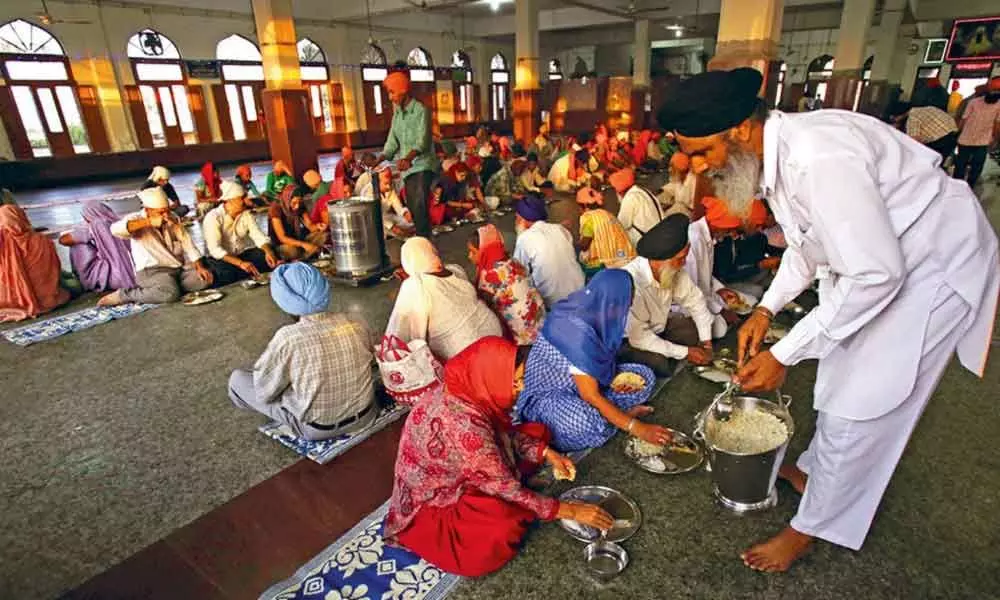Live
- Boxing Day Test Weather Forecast: Rain Delays Expected on Day 3 and Day 4 in Melbourne
- Baby John Twitter Reviews: Varun Dhawan Impresses, but Fans Feel the Remake Lacks Theri's Charm
- Pakistan Air Strikes Kill 46 in Afghanistan, Taliban Confirms Amid Rising Tensions
- ACB Launches Investigation into Formula E Races Held in Hyderabad Last Year
- Mega Job Mela in Madhapur on December 28: Explore Employment Opportunities in Hyderabad
- New Mizoram Guv likely to take charge next week
- Barroz 3D Movie Review: A Visual Treat for Mohanlal Fans, Mixed for Others
- Donate Blood, Save Lives: BJP Hosts Mega Blood Donation Camp in Aiza
- Azerbaijani Airliner Crashes Near Aktau, Kazakhstan: 32 Survive, Over 30 Feared Dead
- Union Minister Bandi Sanjay Kumar to Visit Jogulamba Gadwal District on December 27, 2024
Just In
In a true homage to his teachings, two nations stuck in turmoil left their rivalry aside for a day as India and Pakistan came together to celebrate the 550th birth anniversary of the founder of Sikhism, Guru Nanak.
The Sikh community around the globe rejoiced as they celebrated 550th birth anniversary with fervour and zeal. The Gurudrawaras were lit up, prayers meetings were held, delicious feasts were served to everyone, irrespective of their religion - something Guru Nanak was an ardent advocate of. This important Sikh festival comes on the first full moon after Diwali, which is also celebrated as Guru Purnima.
The celebrations began two weeks before the main day. Early morning religious processions called the 'parbhat pheri' were organised by all gurudwaras across the city. This was followed by the main religious procession, the 'Nagar Kirtan'. A late-night prayer meeting was held on the eve of their Guru's birth anniversary and on November 12, Sikhs from across the city came together to celebrate the occasion, the 'Gurupurab' in a huge gathering at Nampally Grounds. "This is a very important day for us. It reminds us of the Guru's message, which is to stay honest and always help the needy," said Harjinder Singh, a devotee.
The joy of the Sikh devotees knew no bounds when Pakistan, in a move to promote peace, opened the Kartarpur corridor. Kartarpur was the place where Guru Nanak left for heavenly abode. During the partition in 1947, this important and historic Sikh pilgrimage centre fell on the Pakistani side.
At an agonisingly close distance of four kilometres from India, this place was mostly out of bounds for Sikh pilgrims due to the constant clashing of the two neighbouring countries. However, the opening of the Kartarpur corridor meant that devotees could visit the resting place of their Guru visa-free.
"For my parents, it has been a life-long dream to visit both - Kartarpur Sahib and the birthplace of Guru Nanak, Nankana Sahib. But with heavy visa restrictions, it always seemed unlikely. However, this year brings us to hope that we can at least visit one of them. It really does mean a lot," said Gurmeet Kaur.
Previously, the devotees had to use a tower that was set up by the Indian Armed Forces at the border. Using the binoculars, all that the devotees could do was see the Gurudwara that was inside Pakistan's territory.
Born in Talwandi, Pakistan, Guru Nanak is the founder of one of the youngest religions in the world. He was born in troubled times as Hindus and Muslims continuously clashed during those days. He spread the message of peace and one of his main teachings is 'God is One', which cut across religious lines. 550 years later, his teachings are still cutting across all lines as Congress chief Sonia Gandhi and Home Minister Amit Shah spoke of staying devoted to his teachings of peace - a rare agreement between the two political rivals.
Sikhism is known for many things but one key aspect that is widely popular is the concept of 'langar' or a community meal. This was the brainchild of Guru Nanak. He believed that through 'langar', people of all castes, communities and religions can come together and eat. A key aspect of 'langar' is to make sure everyone sits on the ground, irrespective of who they are, as this promotes equality. To this date, every gurudwara across the world follows this tradition and serves everyone, who sit together as equals.
His three main teachings are 'Naam jappo' - which means to meditate with god's name, 'Kirt karo' - which means to live an honest life and 'Vand chakko', which means to share with others and help those in need.
"Internal peace is really hard to find these days. But Guru Nanak's three teachings are the key to finding it for me. I meditate, I try to live an honest life and most importantly, I try to help out people whenever I can. The joy of helping someone does bring a sense of calm and peace to my daily life," said Simarjeet Singh, a Hyderabad-based businessman.
Organisations like Khalsa Aid have dedicated their entire life to following Guru Nanak's teachings of helping the needy. Khalsa Aid is the first respondent to any sort of human crisis, setting up food and medical camps almost immediately. Guru Nanak's words have inspired them to set up camps in war-torn places like Syria and flood-affected Kerala, proving that his teachings are still extremely relevant.
Guru Nanak was moved by the plight of the people and wanted to take this message to all parts of the world. In the year 1500, at the age of 31, he set out on foot to spread the message. He travelled from Pakistan to present-day Assam before returning home in 1507. In his second expedition that lasted seven years, he took the message to Ceylon (now Sri Lanka). In his third 'udaasi' (religious expedition) he travelled to Kashmir, Tibet and present-day Sikkim to spread the message. He followed this up with a longer expedition the fourth time around when he visited the Arab countries and went as far as Mecca on foot to spread the message of peace, harmony and equality.
He vehemently opposed all forms of casteism and always spoke against superstitions.
A fascinating story of his encounter with superstitions comes from his visit to Mecca. Guru Nanak was lying down when a local objected to where his feet were pointing. The locals believed that the Guru's feet were pointing towards Mecca, which is a disrespect to god as no one can point their feet towards god. In reply, Guru Nanak said, 'So turn my feet to where god isn't.'
One thing that stands out about Guru Nanak's teachings is his approach to the world. The basis of everything he taught was 'Sarbat Da Bhala', which means 'Goodwill for all'. This was a key aspect of everything he stood for as he spoke against all forms of discrimination and said that all of us should live in harmony and peace - a message that still is very relevant.

© 2024 Hyderabad Media House Limited/The Hans India. All rights reserved. Powered by hocalwire.com











